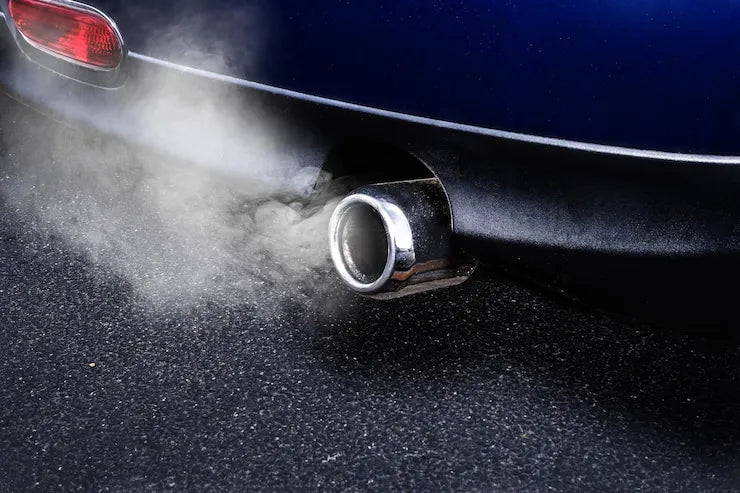
Why Is White Smoke Coming From Your Exhaust? Here's What You Need to Know
Share
Ever looked in your rearview mirror and spotted thick, white smoke trailing your car? It’s not just a spooky sight—it’s often a signal your vehicle is trying to tell you something’s wrong. But don't panic! You're not alone, and more importantly, understanding what white smoke from exhaust really means can save you time, stress, and money.
What Does White Smoke From Exhaust Mean?
White smoke coming from your car’s exhaust usually points to one thing—moisture or coolant burning in the engine. It’s often a sign that something is leaking or damaged, allowing liquids to get into places they shouldn’t.
Is All White Smoke Bad?
Not necessarily. Thin white smoke that disappears quickly on a chilly morning? That’s just condensation. But thick, persistent white smoke? That’s a red flag.
Think of it like a tea kettle. A little steam is normal when things heat up, but if it’s gushing out constantly, something’s clearly boiling over.
White Smoke During Cold Starts
When you start your car on a cold morning, it’s normal to see light, white vapor for a minute or two. It’s simply condensation burning off the exhaust system. If the smoke vanishes quickly, there’s no need to worry.
Coolant Leak Into the Engine
If your engine is burning coolant, it creates thick white smoke. You might also notice a sweet smell—that’s a giveaway. This typically means there’s a leak in the cooling system, often in the head gasket or intake manifold.
Unchecked, this issue can cause engine overheating, leading to even more damage.
Blown Head Gasket – The Silent Culprit
The head gasket is like the glue that keeps your engine sealed tight. When it fails, coolant can seep into the combustion chamber and burn—producing that dreaded white smoke from the exhaust.
A blown head gasket can also cause:
- Loss of engine power
- Engine misfires
- Overheating
It’s one of the most common causes of white smoke and often the most costly if ignored.
Cracked Engine Block
A cracked engine block is serious business. It’s like finding a crack in the foundation of your house. This can allow coolant to leak internally and cause white smoke.
This usually happens when:
- Engines overheat
- Coolant freezes and expands
- There’s poor engine maintenance
You’ll likely need a professional repair or full engine replacement.
Damaged Cylinder Head

Like a cracked block, a damaged cylinder head allows coolant to enter the combustion chamber. It’s less common but just as serious. Symptoms often mirror those of a blown head gasket.
Signs include:
- White smoke from exhaust
- Poor engine performance
- Coolant loss without visible leaks
Fuel System Issues
Sometimes, incorrect fuel injection timing can cause white smoke. If diesel or gasoline doesn’t ignite properly, it may exit the exhaust as white vapor.
This usually affects diesel engines, especially older ones. A bad fuel injector or glow plug could be to blame.
Using the Wrong Type of Fuel
Believe it or not, putting the wrong fuel in your vehicle can cause white smoke. If your car runs on gasoline and you accidentally use diesel (or vice versa), it won’t burn properly.
The result? Clouds of white smoke and possibly engine damage. Always double-check the pump before fueling up!
How to Diagnose White Smoke
Start simple:
- Check coolant levels – Is it going down?
- Look for milky oil on the dipstick – A sign of coolant mixing with oil.
- Sniff around – A sweet smell near the exhaust means burning coolant.
- Run a compression test or coolant pressure test if you’re mechanically inclined.
If all else fails, head to a mechanic for a full diagnosis.
When Should You See a Mechanic?
Here’s a quick guide:
| Symptom | What To Do |
|---|---|
| Smoke disappears quickly | Normal condensation |
| Persistent thick smoke | Get it checked ASAP |
| Coolant loss, overheating | Immediate repair needed |
| Strange engine noises | Don’t delay – see a pro |
Don’t wait until your engine gives out on the freeway. It’s better to be safe than stranded.
DIY Fixes for Minor Issues
If it’s just moisture, no biggie. But for small leaks or gasket problems, you can try:
- Stop leak products – Not permanent, but may buy you time.
- Regular coolant top-ups – Helps prevent overheating.
- Changing to the right oil/fuel type – Prevents combustion problems.
Always follow up with a long-term solution.
The Cost of Ignoring White Smoke
Ignoring white smoke can lead to:
- Engine overheating
- Warped engine parts
- Complete engine failure
What starts as a puff of smoke can become a financial firestorm. Repairing early can save you thousands in future damage.
How to Prevent White Smoke From Exhaust
Here are some tips:
- Routine maintenance – Regular oil and coolant checks.
- Watch for overheating – Pull over if your temp gauge spikes.
- Use the right fuel – Always.
- Don’t ignore leaks – Small drips become big issues.
Prevention is cheaper than repair—always.
Final Thoughts on White Smoke from Exhaust
White smoke from the exhaust isn’t something to shrug off. While it could be harmless condensation, it might also mean your engine is crying for help.
Pay attention. Listen to your car. And if in doubt? Get it checked. A little attention now can save a lot of heartache—and cash—down the road.
FAQs
1. Is white smoke from exhaust always a serious issue?
Not always. Light vapor in cold weather is normal. But thick, persistent smoke usually signals a coolant or engine issue.
2. Can I still drive with white smoke from the exhaust?
It depends on the cause. If it’s minor condensation, yes. But if it’s from a coolant leak or engine damage, it’s best to stop and investigate.
3. What does white smoke with a sweet smell mean?
It often means your coolant is burning inside the engine—a sign of a blown head gasket or internal leak.
4. Can low-quality fuel cause white smoke?
Yes, especially in diesel engines. Poor combustion or wrong fuel type can lead to unburnt vapor, resulting in white smoke.
5. How much does it cost to fix white smoke issues?
It ranges widely—from a $10 fix for a coolant hose to $2,000+ for a head gasket or cracked block repair.
